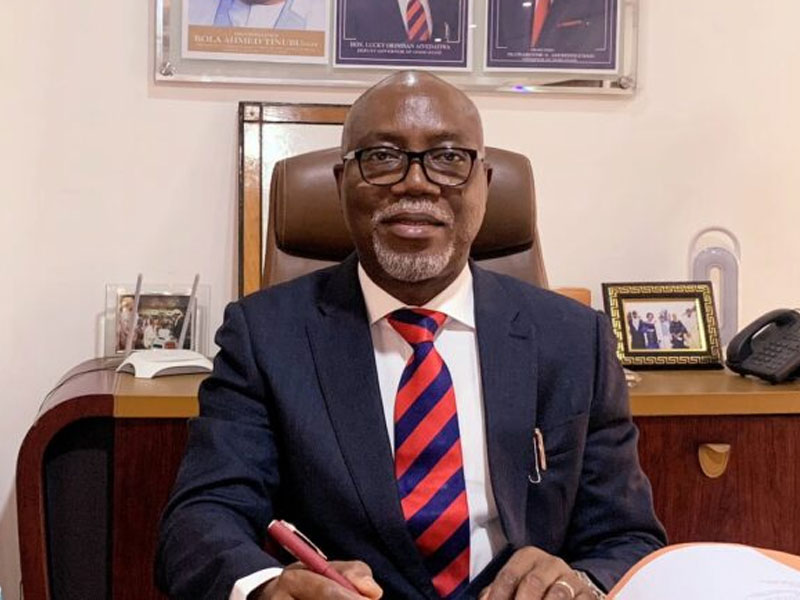The political landscape of Ondo State is currently embroiled in a constitutional debate concerning the composition and functionality of the state’s Executive Council. The crux of the matter lies in the delay by Governor Lucky Aiyedatiwa in appointing a full cabinet, more than 60 days after his inauguration for a second term on February 24, 2025. Legal practitioner Vincent Adodo has publicly voiced concerns, arguing that this delay constitutes a breach of constitutional provisions designed to ensure inclusive and effective governance. Adodo’s argument centers on Section 192(6)(a) of the 1999 Constitution (as amended), which mandates governors to submit commissioner-nominees to the State House of Assembly within 60 days of taking the oath of office.
Governor Aiyedatiwa’s administration, however, has responded dismissively to these concerns. Ebenezer Adeniyan, the governor’s Chief Press Secretary, maintains that Ondo State has a functional cabinet capable of making critical decisions, albeit consisting of only two commissioners: the Attorney General and the Commissioner for Finance. Adeniyan questioned the urgency of Adodo’s concerns, arguing that many governors across Nigeria do not complete their cabinet appointments within two months. He emphasized that Governor Aiyedatiwa is meticulously selecting the right individuals for the remaining positions and will announce the appointments when he deems it appropriate. This stance suggests a prioritization of careful selection over adhering strictly to the 60-day constitutional timeline.
The contrasting perspectives highlight a fundamental disagreement about the interpretation and application of the constitutional provision. Adodo emphasizes the mandatory nature of the 60-day deadline, while the governor’s office stresses the importance of careful selection and implicitly argues for flexibility in the timeline. The governor’s initial appointment of two key commissioners – Attorney General and Commissioner for Finance – immediately after his inauguration can be interpreted as an acknowledgment of the importance of these roles, perhaps suggesting a phased approach to cabinet formation. However, this approach has raised concerns about the functionality and representativeness of the current, minimally staffed Executive Council.
Adodo’s argument extends beyond the mere technicality of the 60-day deadline. He contends that the current two-member council is not representative of the diversity of Ondo State, contravening the principles of inclusivity enshrined in Sections 192(2) and 14(4) of the Constitution. These sections underscore the need for a government that reflects the diverse composition of the state, ensuring a sense of belonging and participation for all citizens. Adodo points to several crucial ministries, including health, education, agriculture, energy, works, and youth development, currently lacking designated commissioners, creating a leadership vacuum and potentially impeding progress in these vital sectors. The absence of leadership in these ministries raises concerns about the effective implementation of policies and programs, potentially affecting service delivery and development initiatives.
Furthermore, Adodo dismisses the argument that special advisers or assistants can effectively substitute for commissioners. He argues that only commissioners hold the constitutional authority to shape state policy alongside the Governor and Deputy Governor, as outlined in Section 193(2). This underscores a distinction between the advisory roles of special appointees and the decision-making power vested in commissioners within the Executive Council. The absence of a full cabinet, according to Adodo, not only undermines the principle of inclusive governance but also potentially hampers the effective formulation and implementation of state policies.
Characterizing the situation as a “serious breach” of constitutional duty, Adodo has called upon Governor Aiyedatiwa to rectify the situation promptly by submitting a comprehensive list of commissioner-nominees to the House of Assembly for confirmation. He emphasizes the need for equitable representation across the state’s nine federal constituencies in these nominations. Adodo frames the issue not just as a political oversight but as a constitutional imperative, crucial for upholding democratic accountability and ensuring effective governance in Ondo State. His appeal stresses the importance of adhering to constitutional provisions not merely for the sake of legality but also for the broader goals of good governance, transparency, and inclusivity.














